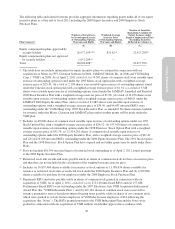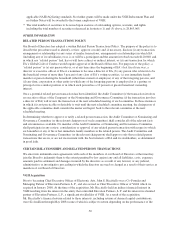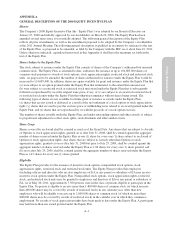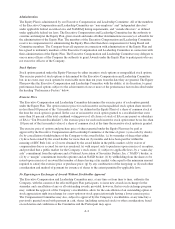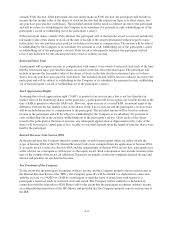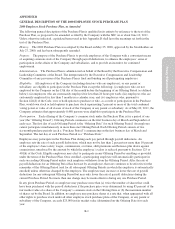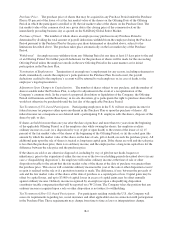Electronic Arts 2011 Annual Report Download - page 67
Download and view the complete annual report
Please find page 67 of the 2011 Electronic Arts annual report below. You can navigate through the pages in the report by either clicking on the pages listed below, or by using the keyword search tool below to find specific information within the annual report.
Proxy Statement
Incentive Stock Options
A participant will recognize no income upon grant or vesting of an incentive stock option and will generally not
incur tax on its exercise. Unless the participant is subject to the alternative minimum tax (“AMT”), the
participant will recognize income only when the shares acquired upon the exercise of an incentive stock option
(the “ISO Shares”) are sold or otherwise disposed of. If the participant holds ISO Shares for more than one year
after the date the option was exercised and for more than two years after the date the option was granted, the
participant will realize a long-term capital gain or loss (rather than ordinary income) upon disposition of the ISO
Shares. This long-term capital gain or loss will be equal to the difference between the amount realized upon such
disposition and the amount paid for the ISO Shares.
If the participant disposes of ISO Shares prior to the expiration of either the one-year or two-year required
holding period (a “disqualifying disposition”), the gain realized upon such disposition, up to the difference
between the fair market value of the ISO Shares on the date of exercise (or, if less, the amount realized on a sale
of such shares) and the option exercise price, will be treated as ordinary income. Any additional gain will be
capital gain, taxed at a rate that depends upon the amount of time the ISO Shares were held by the participant.
Alternative Minimum Tax
The Alternative Minimum Tax (“AMT”) is a separately computed tax which was devised to ensure that at least a
minimum amount of income tax is paid. AMT is imposed only if and to the extent that a participant would pay
more tax if his or her income tax were calculated pursuant to the AMT rules than if calculated in the regular
manner. The difference between the option exercise price and the fair market value of the ISO Shares on the date
of exercise is includable as income for purposes of calculating the AMT for both (i) a vested ISO and (ii) an
unvested ISO for which the participant makes a timely election under Section 83(b) of the U.S. Internal Revenue
Code (an “83(b) election”).
Alternative minimum taxable income is determined by adjusting regular taxable income for certain items,
increasing that income by certain tax preference items (including the difference between the fair market value of
the ISO Shares on the date of exercise and the exercise price) and reducing this amount by the applicable
exemption amount. The AMT (imposed to the extent it exceeds the taxpayer’s regular income tax) is 26 percent
of an individual taxpayer’s alternative minimum taxable income (28 percent in the case of alternative minimum
taxable income in excess of $175,000 in the case of married individuals filing a joint return). If a disqualifying
disposition of the ISO Shares occurs in the same calendar year as the exercise of an incentive stock option, those
ISO Shares are not included in the AMT calculation.
If a participant has to pay AMT, he or she is entitled to a credit against income tax (but not AMT) in later years
subject to many restrictions. Also, upon a sale of ISO Shares that is not a disqualifying disposition, alternative
minimum taxable income is reduced in the year of sale by the amount that was previously included in alternative
minimum taxable income in the year of exercise, i.e. the difference between the amount paid for the ISO Shares
and the fair market value of the ISO Shares on the date of exercise.
Nonqualified Stock Options
A participant will generally not recognize any taxable income at the time a nonqualified stock option (“NQSO”)
is granted or vests provided the exercise price is no less than the fair market value of the underlying shares on the
grant date. Upon exercise of a vested NQSO, the participant will include in income as compensation an amount
equal to the difference between the fair market value of the shares on the date of exercise and the participant’s
exercise price. The included amount will be taxed as ordinary income to the participant and will be subject to
withholding by the Company or its subsidiary (by payment in cash, withholding out of the award or withholding
out of the participant’s salary). Upon resale of the shares by the participant, any subsequent appreciation or
depreciation in the value of the shares will be treated as a capital gain or loss, taxable at a rate that depends upon
the length of time the shares were held by the participant.
Restricted Stock Awards
A participant who receives a restricted stock award will include the amount of the award in income as
compensation at the time that any forfeiture restrictions on the shares of stock lapse, unless the participant makes
A-5


